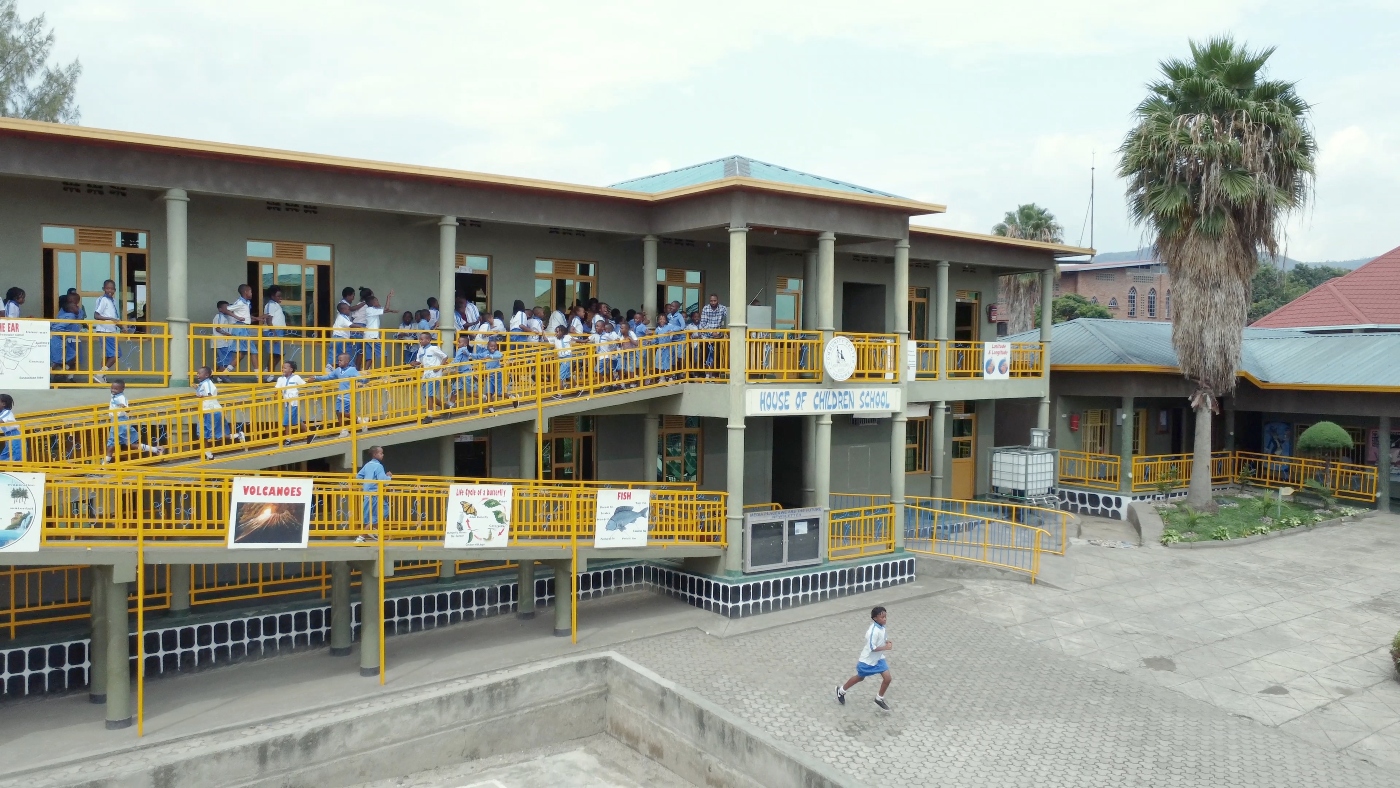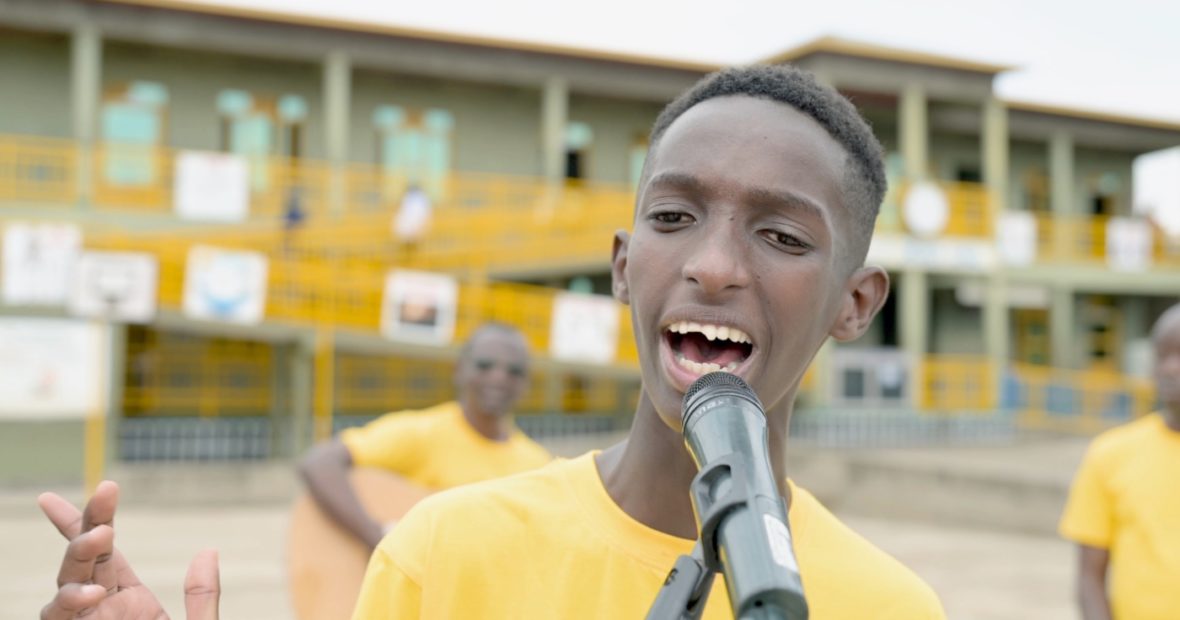In this episode, we learn about the Ubumwe Community Center in Gisenyi, Rwanda, their motto, “disability is not inability,” and the importance of inclusion, especially in communities affected by violence. We first hear from one of the center’s student musicians about how the center’s music program has given him opportunities to perform for others. We then turn to Subhash Sinha, the ICRC’s Physical Rehabilitation Program Manager for east Africa to hear about our work providing prosthetics and orthotics and supporting inclusionary sports programs.

The Ubumwe Community Center in Gisenyi, Rwanda has inclusionary programs in sports, music, and other activities for students with disabilities. The school’s motto, “disability is not inability.” (Ahmed Mohamed Abdel Fattah/ICRC)

The Ubumwe Community Center’s music teachers, Niyitegeka Pie [left] and David Nsengimana [right], helped the students hone their musical talents and produce the music video. (Ahmed Mohamed Abdel Fattah/ICRC)

Twibanire Promesse, 17, sings with the school’s band members, Twagiramungu Theophile on keyboard, Habufite Ismael on guitar, and Sibomana Hamdun on drums, in the music video created with the help of Rwandan recording artist Social Mula and Niyo Bosco. (Ahmed Mohamed Abdel Fattah/ICRC)
Important Links
Read more about ICRC’s 2030 Vision on Disability.
Learn more about ICRC’s work with Physical Rehabilitation and enabling people with disabilities worldwide.
Read more about ICRC’s work in Rwanda for the past 70 years.
Find out more about the Ubumwe Community Center in Gisenyi, Rwanda.
The episode script is now available for the hearing impaired.
SCRIPT
[Umuntu N’ikiremwa song plays for a few seconds and then fades under host narration]
That’s the voice of Twibanire Promesse, a student at the Umbumwe Community Center performing an original song, Umuntu N’Ikiremwa, which in Kin-yar-wanda means “A person is a creation.”
Twibanire was born into a family of musicians.
[Twibanire] “I was born into a family of mostly singers. My parents are singers, and I found myself singing too. It’s my talent, I like it.”
The 17-year-old born with cerebral palsy studies music and computers at the school for students with disabilities. It’s located in the town of Gisenyi, Rwanda near the border with the Democratic Republic of the Congo.
[Music fades]
Our work with the school follows decades of ICRC support to health care and other activities in Rwanda, including during the 1994 Genocide against the Tutsi.
In 2011, the ICRC and local partners began assisting those with amputations and other disabilities by providing them with prosthetic limbs and orthotic support, guiding them in physical rehabilitation, and reintegrating them into society.
And more recently, we started working with schools like the Ubumwe Community Center teaching students with amputations and prosthetic limbs to play soccer.
Today we’ll learn about the school’s motto: “disability is not inability” and the importance of inclusion especially in communities affected by violence. We’ll then turn to Subhash Sinha, the ICRC’s Physical Rehabilitation Program Manager for east Africa to hear about our work providing prosthetics and orthotics and supporting inclusionary sports programs.
I’m Dominique Maria Bonessi, and this is Intercross, a podcast that offers a window into the work of the International Committee of the Red Cross and shares the stories of those affected by armed conflict and other situations of violence.
[Musical Interlude Plays]
[Sounds of guitar chords being strung and piano keys plunked]
[Twibanire] “At the beginning, I was not able to move, I used to stay in bed, I was not able to sit. My parents took me to the hospital, the Gatagara [Gah-ta-ga-rah] Center, which treats people with disability. I underwent kinisiotherapy. I left the hospital in a wheelchair because I was still not able to move. The time came when I stopped using the wheelchair and started to walk with crutches until I stopped using crutches and learned to make steps. Little by little, I managed to walk, even though I’m not great at it but at least, I cannot fall.”
Despite his challenges to walk was determined to sing.
[Twibanire] “Singing makes me happy. Because when I sing, people can learn from it. This is why I am happy because I feel that people can benefit from what I’m singing.”
[Sound of music rehearsal fades.]
Twibanire’s music teacher, David Nsengimana, heard him singing one day in a nearby town and was determined to bring him to the school.
[David] “Then I decided to meet his parents and urged them not to lock him home but informed them about a school that supports children with disabilities.”
Sometimes due to stigmas and stereotypes, people with disabilities are among the most marginalized members of their societies. This isolation can be particularly pronounced in countries and regions affected by conflict. That’s why the ICRC works to support people with disabilities and help them realize their full potential in society through inclusionary programming.
[David] “Just because someone has a disability doesn’t mean they can’t do anything. It was a pleasure when his parents let me teach him, I am now very proud of how far he’s come.”
David, inspired by Twibanire’s story, developed the song, “A person is a creation” with his help and another musician friend.
[Song Umuntu N’Ikiremwa fades back in under Twibanire]
[Twibanire] “The first part of the song speaks about a child who grew frustrated. He was called names and considered rejected by society… I wanted to emphasize that however a child is born, they can contribute to something important.”
The chorus of the song translates to:
A person is a creation.
Created like me. Created like you.
You know that.
This is why it merits to be given equal value
David says the message of the song is clear.
[Music fades]
[David] “The message is that when you take the time to listen to any child with disabilities, they have a lot of amazing potential, all over the world…Let pay attention to them, listen to them, support them….disability does not mean inability.”
With the help of the ICRC, the school is professionally recording the song and filming a music video to highlight their inclusive programs and commemorate International Day of People with Disabilities. Two popular Rwandan recording artists, Social Mula and Niyo Bosco are also collaborating with the student musicians on the music video. The students were especially looking forward to working with Bosco, who lost his sight at 12 due to malaria.
For Twibanire, since coming to the school, he says that he’s noticed a difference in himself.
[Twibanire] “Before joining the music program, I was not able to learn in school with normal children because my fingers do not work well, I was not be able to write… But with music, I hope to have a bright future.”
By 2030, the ICRC’s vision is to be a provider of and advocate for inclusive humanitarian services, which creates and supports opportunities for persons with disabilities to achieve their full potential in societies affected by armed conflict and other situations of violence.
[Pause with musical interlude]
Subhash Sinha is part of that effort in Rwanda. He has been with the ICRC for more than a decade. As a doctor of prosthetics and orthotics, he helped establish the first ICRC amputee football program in 2018 in Tanzania and since then has also helped establish similar programs in Rwanda, South Sudan and Israel and the occupied territories.
My colleague Pierre Celestin [Cele-saun] Muhingabire. [Moo-hinga-bee-ray], interviewed Subhash in Rwanda.
[Pierre] How do sports help those with disabilities?
[Subhash] For me to fit an artificial leg for person with disability, it makes a lot easier if somebody is very active and amputee football is one of the way the people become very active and then easy to fix prosthesis. And after doing these sports, people, they transform themselves, they actually…they’ll actively look for a job or they try to study more and they have a fulfilling their life through different social activity and acceptance is much much higher because these people once the society see them their ability, now people focus on ability not on disability. So it makes a lot of difference not only physically but also psychologically.
[Pierre] Does the PRP program promote breaking down stereotypes and assumptions about people with disabilities?
[Subhash] Physical rehabilitation programs definitely break the stereotyping… Thinking about people with disability. We really want the people to see their ability, not the disability part. And physical rehabilitation program is quite comprehensive. We say it’s a continuing of care. People who got injured, they go to the hospitals and after that they come for the rehabilitation program where we feed people usually with the prosthesis and the different kind of physiotherapy and exercises. And after that we have a social inclusion program where we support them to go for playing sports. Right now we have two sports in Rwanda, one is amputee football and wheelchair basketball. And not only these sports, but also we help them to do a career development programs where the people actively, look for their job. And also we have small grants which we provide them so that they can start small businesses. So it’s quite comprehensive. And physical rehabilitation programs ensure that people who have a rights to go for education, they go to the school. People who have a rights to work, they go for a job. And the physical rehabilitation program actually support them throughout the process.
[Pierre] Do you have a specific story or individual who has stood out to you in your work?
[Subhash] Definitely. I should mention the name of Gatete. Gatete is one of the amputee football players. Actually, he lost his leg during genocide and after that he recovered himself. He go for education. He started playing amputee football. He came to us in the university teaching hospital of Kigali where we fitted him with prosthesis. And now he become a captain of the Rwanda team. And when certain selection of the national team was there, he was the captain. And recently I just heard two days before that he has went to Turkey. He was selected for the program in Turkey. So that was amazing career what he has achieved through his sports and physical rehabilitation program.
That was Pierre Celestin Muhingabire interviewing Subhash Sinha.
[Umuntu N’Ikiremwa song again play under host narration]
Thank yous this week go to my colleagues Lucky Wandia, Chris Sang, and others at the Nairobi and Rwanda delegations.
If you want to see the full music video and photos of the students at the Ubumwe Community Center, please visit our website that: intercrossblog.icrc.org. There you can also sign up our newsletter so you never miss a podcast.
This is our final episode of our 2022 season, and we’ll be back in 2023 with new episodes.
See you next time on Intercross.

